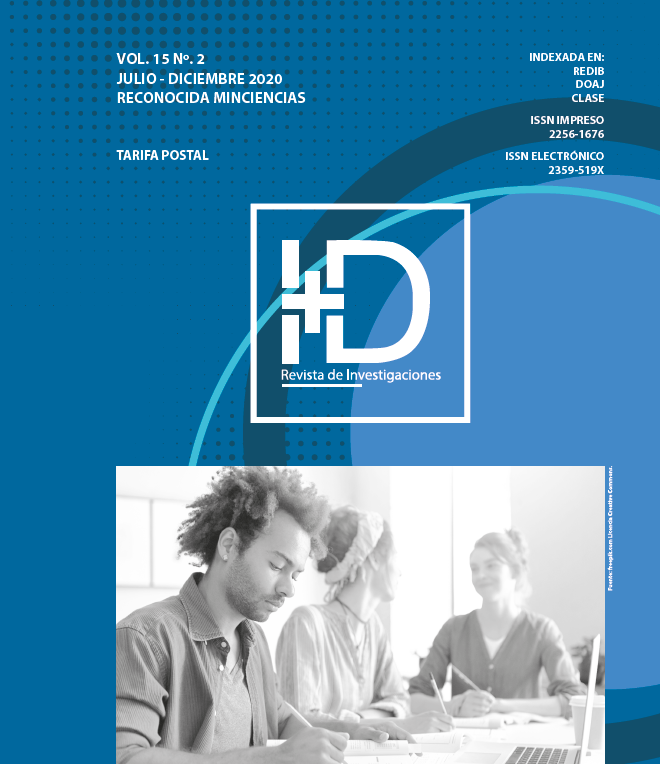Differences in discursive perspectives on old age and death in the elderly who belong to two nursing homes in Bucaramanga
DOI:
https://doi.org/10.33304/revinv.v15n2-2020006Keywords:
Older adults, aging, geriatric, institution, death, discursive perspectives, old ageAbstract
The main objective of this research is to compare the discursive perspectives of old age and death in older adults from two geriatric institutions (public and private) of Bucaramanga. For in which had the participation of 10 older adults, with a semi-structured interview, organizing and classifying the information obtained through the ATLAS ti program (v.7.5), generating the construction of categories and subcategories, which allowed evidence of depressive symptoms in the Public Geriatric Home in relation to old age and suicidal thoughts or ideations with respect to death, unlike Private Geriatric home, where there is a positive perspective about old age and a religious position towards death prevail. Finally, it was sought to provide a scientific contribution at the regional level, since there are few studies carried out on this population, and to promote the implementation of promotion and prevention plans directed at the institution.Downloads
References
Aranda, C., Pando, M., Flores, M., & García, T. (2001). Depresión y redes sociales de apoyo en el adulto mayor institucionalizado de la zona metropolitana de Guadalajara, Jalisco. Revista Psiquiatría Facultad de Medicina Barna, 28(2), 70.
Barenys, M. P. (2012). Los geriátricos, de la institucionalización al extrañamiento. Revista Kairós: Gerontologia, 15(4), 7–24.
Cardona-Arango, D., Estrada-Restrepo, A., Chavarriaga-Maya, L. M., Segura-Cardona, Á. M., Ordoñez-Molina, J., & Osorio-Gómez, J. J. (2010). Apoyo social dignificante del adulto mayor institucionalizado. Medellín, 2008. Revista de Salud Pública, 12(3), 414–424.
Dulcey, E. (2015). Envejecimiento y vejez: Categorías y conceptos. Bogotá: Fundación Cepsiger para el desarrollo humano.
Edwards, D. (1997). Discourse and cognition. Sage Publications.
Erikson, E. (1982). The life cycle completed. New York: Norton.
Garay, A., Iñiguez, L., & Martínez, L. M. (2005). La perspectiva discursiva en psicología social. Subjetividad y Procesos Cognitivos, (7), 105–130.
Garrido, A., & Álvaro, J. L. (2007). Psicología social. Perspectivas psicológicas y sociológicas. Madrid: McGraw Hill.
Gergen, K. J. (1999). An invitation to social construction. Sage Publications ltda.
Gergen, Kenneth J. (2007). Construccionismo social - aportes para el debate y la práctica. Bogotá - Universidad de Los Andes, Facultad de Ciencias Sociales, Departamento de Psicología, CESO, Ediciones Uniandes.
Hernández, R., Fernández, C., & Baptista, M. (2014). Metodología de la investigación. Retrieved from http://observatorio.epacartagena.gov.co/wp-content/uploads/2017/08/metodologia-de-la-investigacion-sexta-edicion.compressed.pdf
López, A. M. (2009). ¿Qué es el envejecimiento? El envejecimiento, su origen, su transcurrir y sus secuelas es un tema que nos preocupa a todos. Retrieved from https://www.intramed.net/contenidover.asp?contenidoID=58673
López, M., & Marín, R. (2016). Revisión teórica y empírica desde la psicología sobre representaciones sociales del envejecimiento y la vejez en Latinoamérica y España (2009-2013). Revista Científica General José María Córdova, 4(17), 155–202.
Ministerio de Salud y Protección Social [MinSalud]. (2013). Envejecimiento demográfico. Colombia 1951-2020. Dinámica demográfica y estructuras poblacionales. Retrieved from https://www.minsalud.gov.co/sites/rid/Lists/BibliotecaDigital/RIDE/DE/PS/Envejecimiento-demografico-Colombia-1951-2020.pdf
Ministerio de Salud y Protección Social [MinSalud]. (2018). Envejecimiento y Vejez. Retrieved from https://www.minsalud.gov.co/proteccionsocial/promocion-social/Paginas/envejecimiento-vejez.aspx
Ollar, J. (1997). Envejecimiento y función cognitiva. De la declinación al deterioro. In Demencia: enfoque multidisciplinario. (pp. 71–97). Buenos Aires: Sagitario Editores.
Organización Mundial de La Salud [OMS]. (2017). La salud mental y los adultos mayores. Retrieved from https://www.who.int/es/news-room/fact-sheets/detail/la-salud-mental-y-los-adultos-mayores
Río, K., Dominguez, P., & Pignocchi, A. (2014). Evaluación del capital psíquico en adultos mayores auto-válidos y dependientes que residen en la ciudad de Mar del Plata (Universidad Nacional de Mar del Plata). Retrieved from http://rpsico.mdp.edu.ar/handle/123456789/50
Rivera, J., & Mancinas, S. (2007). El anciano ante la muerte: Análisis del discurso en el noreste de México. Estudios Sociológicos, 15(74), 341–367.
Rodríguez, G., Gil, J., & García, E. (1999). Metodología de la investigación cualitativa. (2da edició). Málaga: Aljibe.
Rubio, R. (1981). El problema de la muerte en la tercera edad desde la perspectiva psicológica. Revista de Psicología General y Aplicada, 36(4), 719–727.
Santos, M., & Valencia, N. (2015). Envejecer en Colombia. Red de Revistas Científicas de América Latina, El Caribe, España y Portugal, 71, 61–81.
Seelbach, G. (2013). Teorías de la personalidad (1ra Edició). Retrieved from http://www.aliat.org.mx/BibliotecasDigitales/Psicologia/Teorias_de_la_personalidad.pdf
Serra, E., & Abengózar, M. (1990). Ancianidad y preparación para la muerte. Anales de Psicología, 6(2), 147–158.
Vargas-Jiménez, I. (2012). La entrevista en la investigación cualitativa: nuevas tendencias y retos. the interview in the qualitative research: trends and challengers. Revista Electrónica Calidad En La Educación Superior, 3(1), 119–139.
Zavala, M., Vidal, D., Castro, M., Quiroga, P., & Klassen, G. (2006). Funcionamiento social del adulto mayor. Ciencia y Enfermería, 12(2), 53–62.












